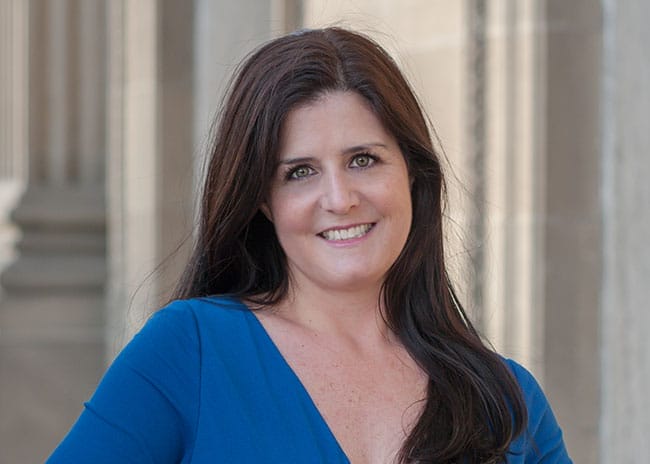If a Wharton graduate were dropped on a desert island, would he or she be able to survive? Jennifer Leonard G00 WG00 got this opportunity in a figurative way—and she did survive. In fact, she became a CFO.
This experience arrived in 2004 when she moved to India, knowing no one and having never been there. How she arrived at this “desert island” moment in her life is a Wharton tangent in her larger Wharton Effect story. She initially was looking to take a six-month sabbatical from her role as Wall Street research analyst. Leonard recalls how she had always wanted to travel to the subcontinent. In looking for a volunteer opportunity there, she connected with a Wharton classmate, whose father connected Leonard with a school in a remote part of India working with children affected by the 2001 Gujarat earthquake. Leonard’s role would be to help formalize the administrative aspects related to running a K-12 school.
“When I got there in the middle of the desert, in the middle of nowhere, it was my Wharton connections that got me there,” she says.
In that desert, Leonard quickly became enmeshed in the organization’s bigger goal: to improve the overall educational system in Kutch, one of India’s most rural regions. So she went from administration at a K-12 school to helping to launch a pharmacy college in her first month.
Months became a year, and she applied for an American India Foundation William J. Clinton Fellowship to work in microfinance. That pivot led to work with SKS Microfinance Ltd. in Hyderabad.
“I wore a lot of hats as one tends to do in an emerging markets environment at a growing company,” she says.
One was as a chief financial officer. Back then, in the mid-2000s, microfinance was considered a “concessionary investment” that led to a haircut on returns. She was able to dispel that notion and raise commercially minded capital (“money from people who want to create a social benefit while also earning a competitive financial return,” as she puts it).
Four years had flown by in India at this point, and she faced the dilemma that many expatriates face—stay for the long haul and build a life in a faraway but beloved place, or return closer to home and family to lay down roots. Besides her time in Philadelphia for school and in India, that home had always been New York City. Return to New York, and Wall Street, she did in 2009, to Morgan Stanley.
Until another “desert island” called—albeit not as far as India—Idaho.
Again, Leonard was prepared to handle a new environment, a new career. There, she serves as vice president of impact investing and co-leads the impact practice at The CAPROCK Group.
“I feel very fortunate because I am deploying impact mandated capital [and] I am getting to look at a ton of interesting investment options,” she says.
This seamless transition from one foreign location and new industry to the next, Leonard says, is possible because of her Wharton and Lauder Institute education. Being able to effectively function in a global context, raise capital for microfinance and social impact vehicles, network with friends and classmates wherever she finds herself—whatever the particulars, her “biggest takeaway in terms of skills and knowledge base was this very broadly applicable toolkit that I have been able to use in so many different situations,” Leonard says.
“I know that if I did end up on a desert island, kind of like in a Gilligan’s Island scenario, I would be OK,” she says.
[well]Wharton Alumni, Submit Your Wharton Effect Story
Wharton Magazine is still collecting tales of the School’s profound impact on alumni’s lives. Have a story to share? Want to have it appear here or in the pages of the magazine? We are looking for people willing to be interviewed, share their story in first person or even submit a video of themselves explaining Wharton’s transformational power in their lives. Here’s how to submit:
- Posting it online at http://whr.tn/wharton-effect
- Sharing it on social media with the hashtag #WhartonEffect
- Emailing it to magazine@wharton.upenn.edu
[/well]

























